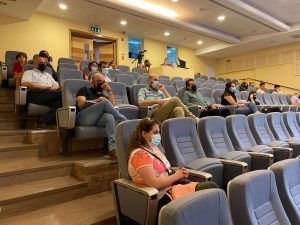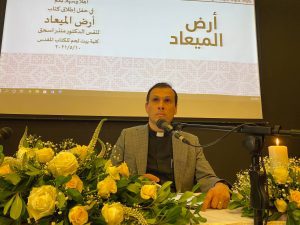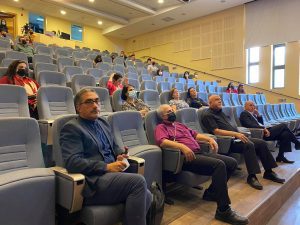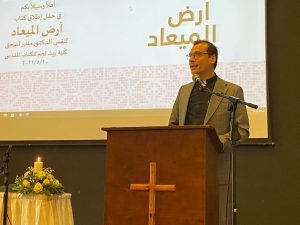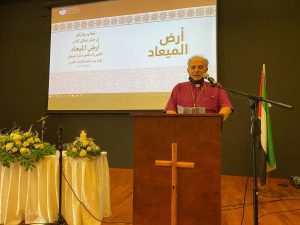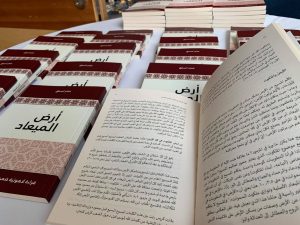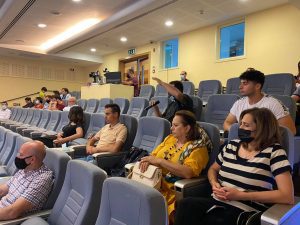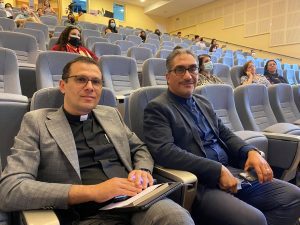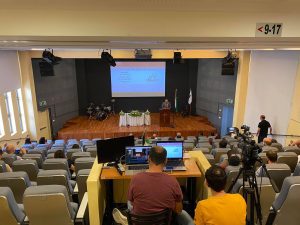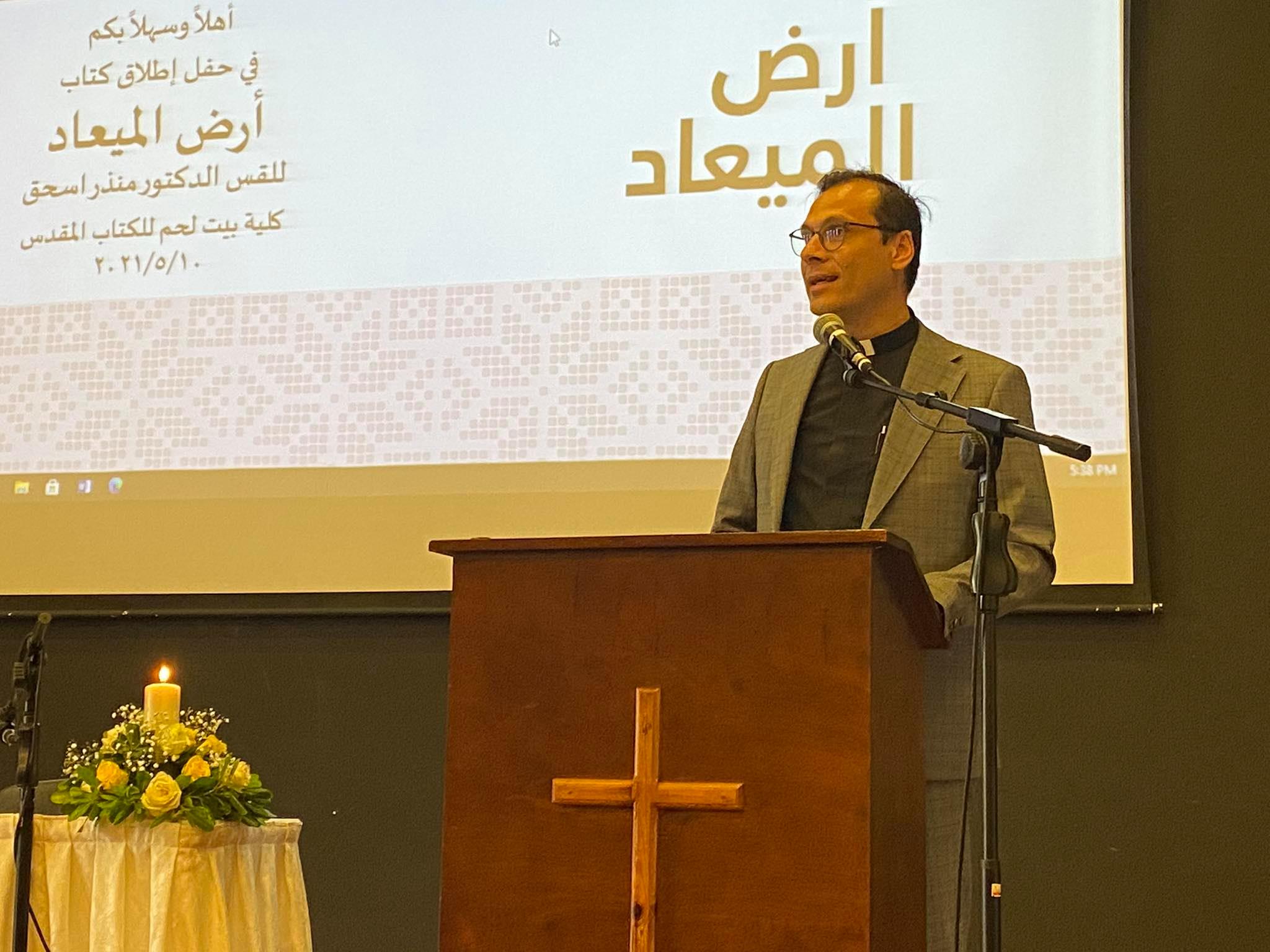
Rev. Dr. Munther Isaac‘s Speech at the Launch Event of His Book “The Promised Land” in Arabic

Rev. Dr. Munther Isaac‘s Speech at the Launch Event of His Book "The Promised Land" in Arabic
Bethlehem Bible College launched the book The Promised Land: A Theological Reading in the Palestinian Context by Rev. Dr. Munther Isaac, the Academic Dean of the College, with the presence of the Bishop of the Evangelical Lutheran Church, Sunni Ibrahim, and the President of the College, Rev. Dr. Jack Sara, and a number of attendees.
Part of the speech shared by Rev. Dr. Isaac provides the background and rationale for the book:
“I would not be exaggerating if I say that this book is the result of 25 years of study and analysis on the subject of the People of God and the Land of God. My interest in this topic was natural as a Palestinian living in this land. Did God give our land to our enemy? This is a question that has haunted me since my childhood as a Palestinian Christian who used to read the Bible. I remember reading the Bible as a young man during the first Intifada (uprising) and found myself faced with contradictory feelings. On the one hand, this is our holy book, through which I became acquainted with my Christian faith. On the other hand, I found in the pages of the Old Testament promises to Israel of my land and my country. This contradiction created a great desire in me for a deeper study of the Bible in its two Testaments, in search of answers to multiple questions about the nature of God, the Promised Land, and God’s chosen people.
“I grew up in a conservative Christian environment that accords a great deal of respect to the idea of holy revelation. This formation affected me by planting in me a love for the Bible on the one hand, and an insistence on absolving it of Zionism on the other hand. I will not hide the fact that I was equally troubled by two things: the first was the exploitation of the Bible by the Zionists, Jews and Christians for political purposes and justification of the occupation, and the second was the reaction by any Palestinian whose answer was to challenge the authenticity of the revelation or the historical events of the Old Testament. I did not accept, for example, for anyone to say that the Old Testament consists of myths or legends invented by the Jews. My concern was to defend and absolve the Bible.
“I believe the issue is one of interpretation. My interest in this book is theological; how can we interpret the texts? This book is a biblical theological study of the concept of the Promised Land, and its field of research is biblical theology. Consequently, the book does not address historical issues or archeology, not because it is not of interest, but because the field of this study is theology. For example, I did not address the historical issue of the Exodus and Entry into the Promised Land, the wars and the division of the land, or the accuracy of the historical narration of events related to the Promised Land and the Kingdom of Israel in the Old Testament. This book is a theological study of the religious meaning of the land in the Bible and the importance of the Promised Land as a theological concept in the biblical faith.
Who should read this book?
“It is for every Palestinian and Arab Christian who searches for Biblical answers that challenge Zionist ideology. It is a tour of the pages of the Bible, the result of years of research and analysis in indigenous languages. I hope that this book will lead to the discovery of hidden jewels in the Bible, and to restore confidence in its theology. Frankly, the Palestinian library lacks books within the field of Biblical studies. This is the importance of this book.
“It is also for anyone looking for answers to Western Zionist Christianity. It is no secret to us that many Christian Zionists are evangelical churches in the West that adopt a conservative approach to the interpretation and concept of revelation. This book provides the tools and interpretations that answer their arguments, from a faith perspective that adopts an academic scientific methodology. I remember when I studied my doctorate on the Promised Land. At the beginning of my study I discussed with my mentor Peter Walker, at the time Professor of the New Testament at Oxford University, the title and methodology of the thesis. My desire was to write about a Palestinian reading of the concept of the Promised Land. Although he supported me, his advice to me was to introduce myself as a Bible researcher first, and to present a biblical study of the Promised Land. After graduation, he told me to write whatever I wanted, but only after I had built a reputation as a Bible researcher – which I did. Hence, the answers in this book are from an academic perspective and from committed Christian exegetical schools.
“The launch of this book coincides with the attacks and Judaization taking place in Jerusalem. What is happening in Jerusalem is ethnic cleansing. What is happening in Al-Aqsa confirms the importance of a sound theology that confronts Zionist ideology and any other exclusionary ideology in the name of religion. There are two chapters in the book on the subject of Zion and Jerusalem in the Bible.”
